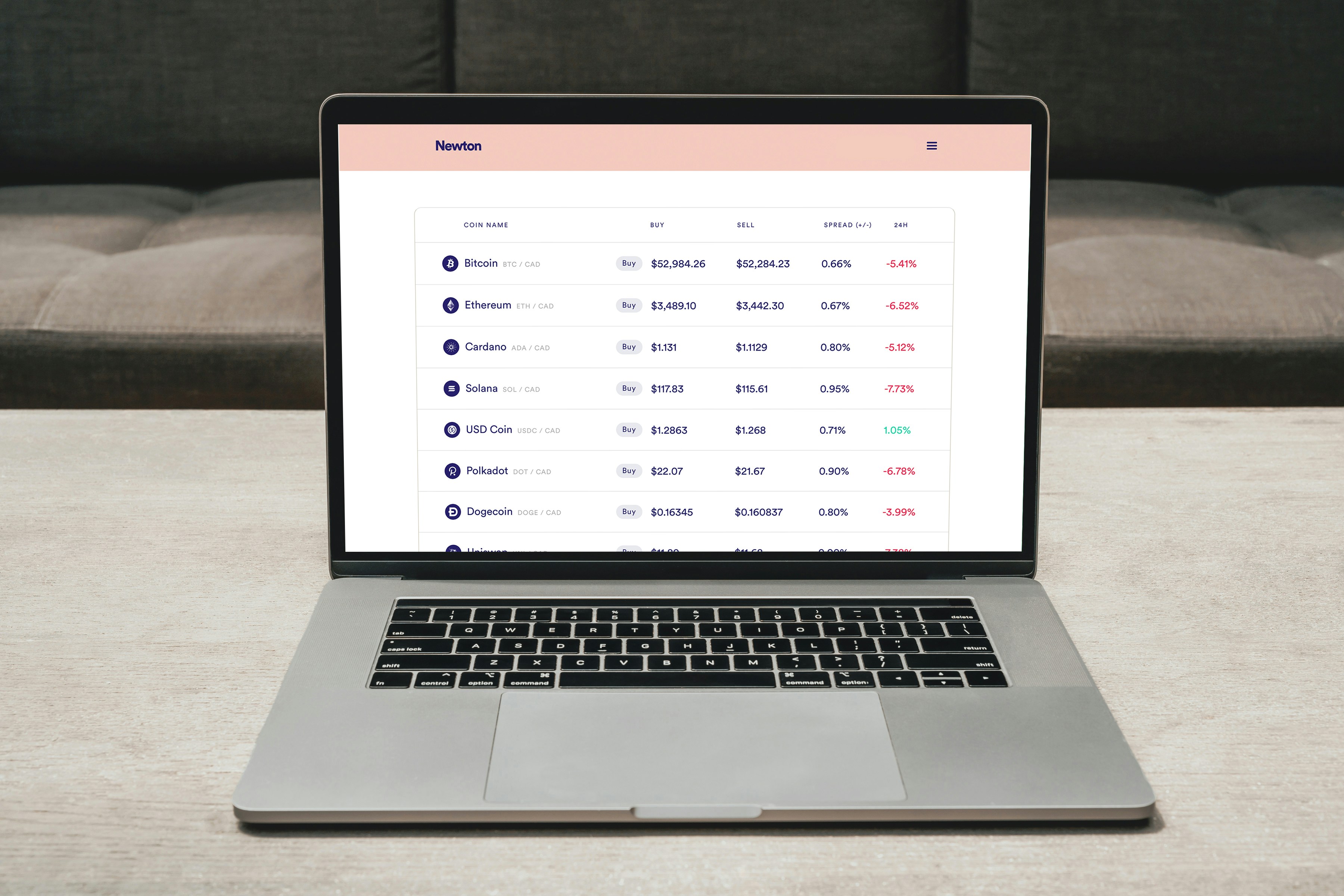
Introduction to Cryptocurrency Trading
Cryptocurrency trading has gained significant traction in recent years, evolving from a niche investment opportunity into a mainstream financial activity. The rise in popularity can be attributed to various factors, including increased awareness of blockchain technology, the allure of decentralized finance, and the potential for high returns on investment. As more individuals and institutions delve into the world of digital currencies, the importance of selecting the right trading platform has never been greater.
Choosing a suitable platform can influence an investor’s overall trading experience, transaction costs, security, and access to diverse assets. Two notable players in this area are Fidelity and Robinhood, each presenting distinct features and services. Fidelity, traditionally recognized for its comprehensive investment services, has stepped into the cryptocurrency realm by offering investors the ability to trade popular digital assets through a robust platform. This venture marks a notable shift as more established financial institutions acknowledge the significance of cryptocurrency as a legitimate investment vehicle.
On the other hand, Robinhood has emerged as a prominent trading platform that appeals to a younger demographic, leveraging its user-friendly interface to democratize the trading experience. Known for its commission-free trading, Robinhood provides users with easy access to a variety of cryptocurrencies, making it an attractive option for new traders exploring digital currencies.
As the cryptocurrency landscape continues to evolve, both Fidelity and Robinhood are vying for market share, each bringing unique advantages and challenges. This blog post aims to explore the offerings of these platforms, comparing their features, fees, and user experiences in order to determine which crypto platform might better serve the needs of investors. Understanding these facets is crucial for anyone considering entry into cryptocurrency trading.
Fidelity: A Traditional Investment Giant
Fidelity Investments, established in 1946, has long been recognized as a prominent player in the investment management industry. With a history of innovation and a steadfast commitment to customer service, Fidelity has cultivated a strong reputation for its comprehensive range of investment products and services. Over the years, the firm has expanded its operations, venturing into the realm of cryptocurrency trading to cater to the evolving needs of its diverse clientele. This strategic move underscores Fidelity’s adaptability and forward-thinking approach in a landscape that increasingly values digital assets.
Fidelity’s entry into the cryptocurrency sector began in earnest with the launch of Fidelity Digital Assets in 2018. This subsidiary was developed to provide institutional investors with a platform tailored for trading and holding cryptocurrencies. The firm has focused on adhering to regulatory compliance, which positions it favorably compared to many alternatives in the crypto space. The emphasis on compliance instills confidence amongst investors who prioritize security and governance in their trading habits.
Another significant advantage offered by Fidelity is the variety of cryptocurrencies available on its platform. Unlike some competitors, Fidelity has managed to include popular digital currencies such as Bitcoin, Ethereum, and others, providing an enticing option for investors interested in diversifying their portfolios. By presenting a wide array of digital assets, Fidelity allows users to explore the potential of the vibrant crypto market while benefiting from the platform’s well-established infrastructure for risk management and support.
Fidelity’s integration of traditional investment expertise with cryptocurrency offerings presents a compelling option for those navigating the complexities of digital assets. As investors increasingly seek avenues to engage with fidelity crypto, the firm’s strong reputation, commitment to regulatory standards, and variety of offerings position it as a formidable contender in the competitive landscape of cryptocurrency trading platforms.
Robinhood: The Challenger Revolutionizing Trading
Robinhood has emerged as a significant player in the financial trading landscape, particularly known for its revolutionary commission-free trading model. Founded in 2013, it has attracted millions of users, especially from a younger demographic, who are eager to enter the investing world without encountering hefty fees that traditionally burdened stock and cryptocurrency trading. By eliminating commissions, Robinhood allows users to engage in trading activities more freely, including the buying and selling of cryptocurrency assets, fostering greater participation in the crypto market.
The platform’s user-friendly interface is particularly appealing to novice investors. It simplifies the investment process, allowing individuals, regardless of their financial expertise, to access various cryptocurrencies with ease. This accessibility is vital for attracting the next generation of investors who seek straightforward and uncomplicated trading solutions. The intuitive design ensures that users can navigate through their portfolios and execute trades without extensive financial knowledge, further revolutionizing how crypto trading is perceived and undertaken.
Moreover, Robinhood caters adeptly to the needs of a new generation of investors by providing educational resources and insights into cryptocurrency trading. The platform’s commitment to transparency and user engagement ensures that clients are not just trading assets but are also gaining an understanding of the cryptocurrency landscape, enhancing their investment acumen. The limited but strategic selection of cryptocurrencies available on Robinhood allows users to delve into the crypto market without overwhelming choices, focusing on popular options such as Bitcoin and Ethereum.
In its approach, Robinhood not only competes with traditional brokerage firms but also positions itself as a formidable contender against dedicated cryptocurrency platforms like Fidelity Crypto. By prioritizing a unique blend of accessibility, education, and user engagement, Robinhood is successfully redefining the trading experience for digital assets, thus appealing to a diverse array of investors.
Comparison of Trading Fees and Costs
When evaluating cryptocurrency trading platforms like Fidelity and Robinhood, one critical aspect to consider is the structure of their trading fees and associated costs. These fees can significantly impact the overall profitability of trading activities, particularly for frequent traders or those dealing in larger volumes of fidelity crypto.
Fidelity stands out due to its commitment to providing a no-commission trading environment. This approach is particularly advantageous for users investing in cryptocurrency, as they can buy and sell assets without the burden of direct commission fees. However, it is essential to note that while Fidelity does not charge trading commissions on cryptocurrency transactions, there may still be other costs involved, such as spreads between buy and sell prices, which can vary based on market conditions.
On the other hand, Robinhood offers a similarly attractive structure by also providing commission-free trading for a wide range of cryptocurrencies. This has positioned Robinhood as a favored platform, especially among novice traders looking for an accessible entry point into the world of digital assets. Nevertheless, users should be vigilant about potential hidden costs. For example, Robinhood incorporates a spread markup on trades, which may not be immediately apparent to users but can have a noteworthy effect on the total cost of executing trades.
Moreover, both platforms have differing policies when it comes to transferring cryptocurrencies. Fidelity generally permits greater flexibility in withdrawing and transferring assets, which is crucial for traders who want to move their fidelity crypto holdings to external wallets. Conversely, Robinhood has limitations surrounding withdrawals that could affect traders needing immediate access to their cryptocurrencies.
Ultimately, while both Fidelity and Robinhood offer no-commission trading models, traders must thoroughly assess additional fees and withdrawal policies to determine which platform aligns best with their trading needs and preferences.
Security Measures: Protecting Your Investments
When comparing the security measures of Fidelity and Robinhood, it is paramount to understand how each platform safeguards users’ crypto investments. Both platforms have implemented substantial security protocols to protect against unauthorized access and potential breaches, addressing many users’ primary concerns regarding digital asset safety.
Fidelity has long been recognized for its robust security infrastructure. The platform employs advanced encryption techniques to secure user data and transactions. Multi-factor authentication (MFA) is also a standard feature, adding an extra layer of security by requiring users to verify their identity through multiple methods. Additionally, Fidelity utilizes cold storage solutions for the majority of digital assets, meaning that the vast majority of clients’ cryptocurrencies are stored offline. This minimizes the risk of hacking and theft significantly. The company has also established a clear and efficient protocol for dealing with potential breaches, ensuring swift communication and resolution to maintain user trust.
On the other hand, Robinhood has made strides in security but faces more scrutiny due to its more recent entry into the cryptocurrency space. Like Fidelity, Robinhood offers two-step verification, enhancing account protection. However, while Robinhood uses cold storage for the majority of its cryptocurrency, it retains a portion in hot wallets to facilitate instant trades. This practice could potentially expose users to heightened risks if not managed correctly. In terms of breaches, Robinhood has previously faced criticism for handling security issues more reactively. There has been an emphasis on improving transparency with users concerning security measures and incidents, signaling its commitment to safeguarding crypto investments.
Both platforms illustrate a commitment to security, but Fidelity’s long-established practices may provide a higher level of confidence for users concerned about the safety of their fidelity crypto investments. The distinct approaches each platform takes demonstrate varying philosophies regarding balancing accessibility and security.
User Experience and Interface Comparison
The user experience and interface of a trading platform is a crucial factor that significantly impacts the efficiency and satisfaction of its users. When analyzing Fidelity crypto and Robinhood, both platforms showcase distinct characteristics tailored to their respective audiences, impacting usability for novice and experienced traders alike.
Fidelity crypto offers a comprehensive dashboard that provides users with in-depth market data, intuitive charting tools, and various educational resources. The interface is designed to cater to both seasoned investors and beginners, making it easy to transition between advanced trading features and basic functionalities. New users can utilize tutorials and help sections that guide them through placing trades, analyzing portfolios, and understanding market trends, thereby enhancing the overall experience.
On the other hand, Robinhood is known for its simplified interface, which prioritizes ease of use and accessibility. The platform’s design is minimalistic, focusing on essential features, which may appeal to millennials and younger investors who favor streamlined experiences. Navigation is straightforward, with major functionalities easily accessible from the main screen. However, this simplicity may come at the cost of depth; advanced tools and analytics found in Fidelity crypto might be lacking, which could deter users seeking more sophisticated trading options.
Both platforms also excel in mobile functionality, ensuring traders have access to important information on-the-go. Fidelity crypto’s app maintains a professional look with robust features similar to its desktop version, while Robinhood’s mobile app provides a user-friendly experience that emphasizes quick trades. Nevertheless, the accessibility of advanced analysis tools is more pronounced on Fidelity crypto, which gives it an edge in catering to experienced traders.
In summary, while both Fidelity crypto and Robinhood offer distinct user experiences, the choice ultimately depends on individual trading needs and preferences, with Fidelity appealing more to those seeking comprehensive tools and analysis capabilities.
Available Cryptocurrencies: A Feature Breakdown
When evaluating the cryptocurrency platforms offered by Fidelity and Robinhood, a critical aspect to consider is the variety of cryptocurrencies available for trading. This diversity can significantly impact investors looking to diversify their portfolios and capture opportunities across different digital assets. Fidelity crypto offers a more extensive selection of cryptocurrencies compared to Robinhood, which may appeal to experienced traders as well as those new to the market.
Fidelity has made a substantial commitment to the cryptocurrency space, providing access to a wide range of digital currencies. As of the latest updates, users can trade well-known cryptocurrencies such as Bitcoin, Ethereum, and Litecoin, along with several altcoins that cater to specific niches within the market. This breadth of options enables investors to construct a well-rounded portfolio, allowing them to hedge risks and capitalize on various market dynamics.
On the other hand, Robinhood, while popular for its commission-free trading model, has a more limited selection of cryptocurrencies. Users can trade major cryptocurrencies like Bitcoin and Ethereum, but the platform lacks support for many altcoins that could provide potential growth opportunities. For traders focused on Fidelity crypto, the availability of lesser-known tokens can represent a strategic advantage, particularly for those looking to invest in emerging projects or trends.
The importance of variety in investment options cannot be overstated. By offering a greater number of cryptocurrencies, platforms like Fidelity enable investors to explore niche markets and take advantage of potential higher returns. Therefore, as individuals consider their options between Fidelity and Robinhood, the breadth of available cryptocurrencies should be a decisive factor in determining which platform best aligns with their investment strategies and goals.
Research and Educational Resources
When it comes to navigating the complex landscape of cryptocurrency trading, educational resources and research tools play a pivotal role in supporting users’ decision-making processes. Both Fidelity and Robinhood have recognized the importance of providing their users with adequate research materials to foster informed trading decisions. However, the approach and depth of resources vary significantly between the two platforms.
Fidelity crypto is renowned for its comprehensive educational offerings. The platform provides a variety of resources including detailed research reports, market analyses, and interactive educational content. Their investment in high-quality research is evident through the extensive library of articles and white papers that cover both fundamental and technical aspects of cryptocurrency. Additionally, Fidelity offers webinars and online courses that cater to various experience levels, enabling users to enhance their knowledge base effectively. This emphasis on education supports a more informed trading strategy, particularly for users who are new to cryptocurrency.
On the other hand, Robinhood has a more streamlined approach to educational resources. While the platform does provide basic educational materials aimed at beginner traders, its offerings may not be as comprehensive when compared to Fidelity. Robinhood includes short articles and tutorials to explain concepts related to crypto trading. However, it largely focuses on user interface and seamless trading experience, potentially at the expense of in-depth educational resources. Users may find that while they can execute trades easily, they may not have access to the same level of research and analytical tools available on the Fidelity platform.
Overall, while both platforms strive to educate their users about fidelity crypto trading, Fidelity’s extensive resources and commitment to user education provide a more robust foundation for traders seeking a detailed understanding of the market.
Conclusion: Which Platform Comes Out on Top?
In evaluating Fidelity and Robinhood as potential platforms for trading fidelity crypto and other cryptocurrencies, several key aspects emerge that may sway an investor’s decision. Both platforms offer unique advantages and drawbacks, catering to distinct types of users in the rapidly evolving cryptocurrency space.
Fidelity presents a robust option for investors looking for a more comprehensive approach to their financial portfolio. Their established reputation, extensive research tools, and emphasis on security make them a formidable player in the industry. Additionally, Fidelity crypto trading allows users to access a broader range of services, including retirement accounts and traditional investments, which could appeal to those seeking a long-term investment strategy. However, the platform’s slightly more complex interface and the need for a minimum investment may deter novice traders.
On the other hand, Robinhood excels in accessibility and user-friendliness. Its minimalist design and commission-free trades make it particularly attractive to younger investors and beginners venturing into cryptocurrency. Robinhood’s mobile-first approach allows for easy trading and management of assets, ensuring that users can engage with their investments on-the-go. However, the platform has faced scrutiny regarding its customer support and limitations in available cryptocurrencies compared to Fidelity, which could raise concerns for more seasoned traders seeking diverse options.
Ultimately, the choice between Fidelity and Robinhood will depend on individual preferences and investing goals. For those who prioritize comprehensive investment options and expertise, Fidelity might be the preferable choice. Conversely, for beginner investors seeking simplicity and immediate access to fidelity crypto without fees, Robinhood could emerge victoriously. Evaluating these factors carefully will help potential users navigate their decision effectively.





